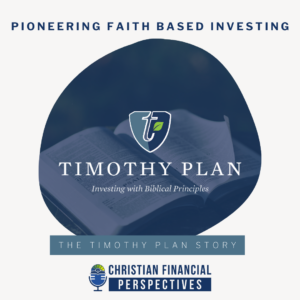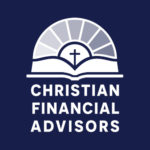Click below to listen to Episode 174 – Pioneering Faith Based Investing: The Timothy Plan Story
Subscribe: Apple Podcasts | Google Podcasts | Spotify | Amazon Music | Stitcher | RSS | More
Pioneering Faith Based Investing: The Timothy Plan Story

Learn about the history of The Timothy Plan, one of the pioneers of the BRI movement.

Delve deep into the history of Christian financial stewardship and Biblically Responsible Investing (BRI) as Shawn speaks with Timothy Plan team member, Brian Mumbert. Christian Financial Advisors is proud to be a part of this movement since the beginning of Timothy Plan.
30 years ago, Timothy Plan introduced only a few morally responsible investment fund choices, and they now offer several mutual funds and ETFs, along with multiple other firms now offering Biblically Responsible Investment options. They are a leader in the BRI movement and have truly helped pave the way for values based investing when it comes to Christians investing with their Biblical principles in mind.
The history of BRI, its growth, and how far it has come over the years is truly a blessing!
GUESTS: Brian Mumbert
HOSTED BY: Shawn Peters
Mentioned In This Episode
Want to ask a question about your specific situation? Schedule a complimentary 15 minute phone call.
EPISODE TRANSCRIPT
Shawn (00:00):
Ever wonder about the origins of Biblically Responsible Investing? Today we’re diving deep with Brian Mumbert from The Timothy Plan, a trailblazer in the BRI world. You don’t want to miss these eye-opening insights. Let’s get some perspective.
(00:20):
Welcome to another episode of Christian Financial Perspectives. My name is Shawn Peters. We’re so glad that you’ve joined us. If you do enjoy content on finance, but from a Christian perspective, we’d love for you to hit that subscribe button and join our growing community of Christians who are wanting to glorify God with their finances. Now today I’m actually joined by a special guest, Brian Mumbert from The Timothy Plan. Bob is not available, so we decided we’d do a special episode for you. And with this episode, we thought it would be useful to cover a little bit of the history of Biblically Responsible Investing or BRI as that’s what our firm focuses 100% on. And with Brian from The Timothy Plan here, I thought it might be good for us to cover a little bit of the history of Timothy Plan and their role in the BRI movement. Some of you may not know this, but The Timothy Plan was very much a pioneering force in the early days of the BRI movement, still is. And much like my father-in-law, Bob, who is founder of Christian Financial Advisors, they were very instrumental in those early years, I would say. But anyway, without further ado, Brian, thank you so much for joining us.
Brian (01:38):
Thank you, Shawn. I really appreciate being here and there’s a lot of shared connection between Timothy Plan and Bob as Bob was one of the first advisors to really take this Biblically Responsible Investing mandate and really work it into his practice. It was so neat to see. And this was back, we’re talking 1994, or as my son refers to it, back in the 1900’s, which just makes us feel really old.
Shawn (02:02):
Oh yeah, for sure.
Brian (02:03):
But it’s just exciting to connect with fellow BRI believers and to be on this podcast. Thank you.
Shawn (02:08):
Yeah, absolutely. And the respect is very much mutual, Brian. Bob has spoken very highly of Art Alley, since I know he’s known him for a number of years, and their collaboration as pioneers in the BRI industry. So with our shared history, I guess you’d say as our shared firms, but with our shared history, do you think you could shed some light for our viewers and listeners on the early days of Timothy Plan and some of the challenges that you encountered?
Brian (02:34):
Sure. So early on in Timothy Plan, you have to go back to the start and what caused Art Alley to even do this. He was a financial advisor. He had his own practice and he was looking to put together retirement plans for nondenominational pastors. And ultimately what he found was that he could not get any of the fund managers to take on this mandate of screening out or filtering companies that would not profit from things like abortion or pornography. They said it couldn’t be done. They didn’t want to take the challenge, they didn’t think the performance would be okay, and they told him he was crazy. So he ended up starting Timothy Plan to be this retirement plan for non-denominational pastors. It ultimately ended up being a mutual fund. There was a lot of skeptics out there though. I mean outside of the investment advisor community.
(03:24):
The consumer had no idea. This whole idea of investment is ownership and how this all works, and I’m just investing in a mutual fund. It’s a growth fund. What’s in this fund? I don’t even know. And so, the education challenge was huge. There were a lot of financial challenges at Timothy Plant when we first started. There were times where we didn’t know if we were going to make it. Art had to meet net capital several times in the early days and go back and ask for more funding and more funding to continue and say that this is going to work. Just trust me. And again, Bob was there at the beginning using our funds, and we had one fund, and so you’re trying to allocate your clients into different asset classes, but all we can give you is small cap. And that was a frustration, but through a lot of faith, a lot of prayer, a lot of support in the community, it became a viable option. And here we are almost 30 years later.
Shawn (04:17):
Yeah, man. Well, it’s so heartening to hear about the support from stalwarts like Bob, given our firm’s focus on BRI, I know firsthand about the challenges, but also the rewards. So what unique hurdles did Timothy Plan face due to its BRI focus?
Brian (04:36):
There were a lot of skeptics, again, that said that this could not be done. When we started this, you had social investing was a big thing. You could remove things like alcohol and tobacco and gambling, but we had to lay the groundwork for this. And then like I said, the education was the big issue. So you could educate the advisor, but then the advisor, we had to count on them to educate their clients. Unfortunately, you did not have a lot of advisors like Bob that would be willing to put themselves out there as Christians and to even just ask simple questions to their clients, are there any moral or ethical concerns that you might have before I make any recommendations in these portfolios? And so changing the habits of something that they’ve been trained for decades on was a big headwind.
Shawn (05:27):
Right. And then logistically, did you have any challenges there as far as with BRI and being able to actually align the funds with the different screening process?
Brian (05:41):
It took a lot of time to build this screening network or a screening of companies as we’ve done. And the benefit of being as whole as we are now is now we have data that goes back 30 years. And so we’re looking at companies and when we look at these companies, we’re looking at a repeated pattern. Is it something that a company does every year? Do they fund Planned Parenthood corporately every year or is it just one time back in the 1900’s when they did it and they haven’t done it since? Because we’re not in the business of just punishing a company for something they did decades ago. We want to see that a company is doing these things on a regular basis.
Shawn (06:21):
So that continuous research, adaptation, and monitoring, because you might have a company that for some time was involved in some contentious areas and stuff that wouldn’t align with our beliefs, but if they then change or maybe they have some new leadership and you notice in the monitoring that, “Hey, they’re not involved in these anymore.” Okay, great. Well, that might be a viable option then for some of the funds.
Brian (06:45):
Absolutely. I mean, we’ve seen companies that have changed their patterns. Some for the better, unfortunately, probably more for the worse as we’ve gone in a certain direction in this culture. But still letting each company know, this is why we do not invest in you. We would like to invest in your company, but unfortunately, this is why we cannot really has generated some conversations.
Shawn (07:07):
Got it. Well, it’s always about the community, isn’t it? So speaking of that, I’d love to hear a little bit about how Timothy Plan handled some of the societal challenges, especially in the early days.
Brian (07:19):
Yeah, so there was a lot of pushback. There was a society that did not understand what we were trying to do. I kind of already touched on this before, but the whole “investment is ownership” piece. I was taught that when I was in high school in economics. If I’m shareholder, I’m part owner of a company. But unfortunately, the vast majority of people don’t really understand that concept. And to put it in the most simple terms, if I purchase shares of a company and we could use a tobacco company, for example, I need that company to be profitable. What is their business? Well, cut and dry their business is selling tobacco and ultimately the addiction of people that are using their products. If I’m shareholder of that company, I need them to do whatever they do better and more of. And so unfortunately, if I own a company like that, morally, it can create a big question in my mind about what am I doing with the money that God has entrusted to me here? How am I earning these dollars? And I’ve heard many describe “ill gotten gains” as it talks in Proverbs.
Shawn (08:24):
That’s a good example.
Brian (08:25):
And yeah, it really is that. So education, again to the end client, Art put together a Biblical stewardship series actually many years ago to kind of really do this because ultimately people need to understand that there is a way to align their investments with their faith. They just have to hear about it, they have to know about it. And advisors like Bob that tell them about it. That’s really the key.
Shawn (08:51):
Many people from what I’ve seen personally, but also from hearing from Bob, from his experience in working with you guys, that people would see BRI as it’s somehow restrictive or it’s outdated, like, oh, whatever. Those values don’t matter. But at the end of the day, it does matter. I mean, because if you have a certain set of beliefs as a Christian that you apply to your entire life, and then when it comes to your finances, when it comes to your investments, you leave it at the door, how could you possibly say that you’re really giving your life to Christ, that God is actually the God of your entire life? Because I remember, I think Bob was the first one that gave me this example, but use the analogy of someone accepts Christ and they’re going to get baptized and right before they get dunked under the water.
(09:37):
Well, for me and Bob, we’re Southern Baptist, so we got dunked, not sprinkled, but
Brian (09:40):
I’m a dunker.
Shawn (09:41):
Assuming you’re a dunker, right Before you get dunked under the water, you grab your wallet and hold it up above the water. You’re like, well, okay, Lord, I’m dedicating my life to you except for my wallet. It’s kind of the same idea that somehow that doesn’t apply or matter, and in reality it does. And I would say more so even than on their retail side, when people say, well, there’s a lot of companies that you only have a few choices for necessities. Okay, well, that’s very different than when you come to an ownership side. There’s a lot of choices, not just between mutual funds and ETFs, things like that, but just in general, the number of companies that are available to invest in. With so many options, you can’t really make the argument of, well, there’s no way to actually do this, or there’s no way to be clean.
Brian (10:26):
You really hit the head on there because the whole choice thing is the huge thing. You get pushback all the time. I have an Apple phone. Well, my choices in phones are limited, unfortunately. My cell carriers, unfortunately, are limited. And some of them are in the cable business, in broadcast pornography. I’m sorry. I wish I had a better choice. And I know that there are some out there, and we’re getting better with these things. But ultimately, in the investment world, I get a choice.
Shawn (10:52):
There’s lots of choices.
Brian (10:53):
Take control of the finances and do what God wants me to do as a steward of his money and invest Biblically. And it’s a huge, huge thing that many more Christians could understand. I love that image of holding the wallet above your head.
Shawn (11:08):
Feel free to use that. It’s not copyright or anything.
Brian (11:10):
That’s fantastic.
Shawn (11:11):
Yeah. So would you say, I guess that really over time, from those early days to now, that we’ve really seen more of a shift in people’s perceptions as the alignment of their investments and their faith continue to gain traction?
Brian (11:25):
Yes. I’d say definitely three decades now basically of this. And now there’s other people in the business that are doing this, other firms that are doing this, other investment companies that are providing product, and it’s great to have more product. We need more choices. So yes, it’s come so far, and I think that honestly, investors have learned, especially if you just take the microcosm of this past year, that companies are not their friends. They will do things that will really alienate half of their client base and they do not care. And it’s up to you to tell them that, and how are you going to tell them that you can try to boycott, and we’ve all done this before, but in reality, stop investing in the company. That’s how you tell them.
Shawn (12:09):
If their share price starts dropping, that’ll get their attention real quick.
Brian (12:12):
Absolutely.
Shawn (12:12):
That’s something that I think with companies like Timothy Plan, and I know there are others that we work with as well, but when you have mutual funds and ETFs, one of the other benefits of doing that is that we have this collective bargaining power that through a company like Timothy Plan being able to say, “Hey, we’re divesting from your company because we just found out that you now own a casino, this real estate fund or something like you own this casino or you are now giving to Planned Parenthood,” and you say, “We’re going to be moving out.” And if it’s one investor with a thousand dollars and maybe even a million dollars, the company say, I don’t care, whatever. But if it’s multiple millions or even hundreds of millions of dollars, they’re like, “We’re going to leave.” Well, now all of a sudden they’re more likely to listen.
Brian (13:01):
Absolutely. I mean, you’ve gone from a position where I feel helpless to enact change to. If we all as Christians did this, we can enact the change that we’re looking for. And so at this point it’s like, what are you waiting for?
Shawn (13:14):
Yeah. Yeah. So I really say with all of that, I know we covered quite a bit there, but it’s really a testament to perseverance and continuing that even when it seemed like nobody was listening, it seemed like maybe you weren’t going to make it or whatever, but just a testament to perseverance. And shifting gears a little bit, looking at BRI’s trajectory over the years, how have you seen the industry evolved and where do you see it heading now?
Brian (13:41):
It’s a really exciting time because when we started, it was just mutual funds and mutual funds are still a huge part of what everyone invests in. But four years ago we started ETFs as well, and now I know there are other firms out there that do SMAs and different products like that. So the product lineup is really increasing because ultimately you want to do this in every aspect of your investment life, and you’re going to need different products for different investors. So it’s exciting to see what’s gone from one small cap value fund to 12 mutual funds, seven ETFs at Timothy Plan alone, and then ultimately other firms and other investment companies that have other products as well, and just giving investors the choice to do this. And so it’s come so far. The future really is unlimited on this. I mean, it’s just, again, it’s a matter of education. It’s a matter of the clients knowing they have the choice, and it’s a matter of making an impact with your dollars.
Shawn (14:37):
Now, I know our firms come at this a little bit differently. You guys focus more on providing the fund choices, and whether it’s Mutual Fund or ETF and our firm Christian Financial Advisors, we focus more on working directly with investors, with clients. But that being said, have you noticed much of a shift as far as does it seem like more people seem to be finding you and seeking you out and wanting to learn more about BRI and about aligning their faith in their investments?
Brian (15:06):
I would say absolutely. I mean, you look at all these reports and there is a lot of truth to this that the churches are shrinking, that Christians are falling away from the church, are walking away from their faith, but the ones that are staying are very dedicated in their faith. And as we continue to push this back out into the United States and abroad, this is a way that we can again, take capital and make a difference in society, and we have to be transparent about what we’re doing here. It is a challenge, but there’s a lot of cooperation between the firms that are doing this to increase this movement. We have advisors like Bob that are a big part of groups like Kingdom Advisors that are pushing this forward. And so ultimately, it’s still a very exciting time. And I have to say, interestingly enough, one of our best advertisers recently has been companies like BlackRock that have been pushing ESG, and people are realizing that might not be exactly what I’m looking for. It is a values aligned investment. It’s just not quite the value I thought I was getting.
Shawn (16:18):
Okay.
Brian (16:18):
Yeah.
Shawn (16:19):
You threw me a little bit when you said BlackRock. What do you mean? Okay.
Brian (16:22):
Yeah. So we’re finding people that find us because they’re looking for something that’s more reflective of their personal faith. And so through no fault of their advisor, they heard those words. They thought, well, this must be exactly what they’re looking for. And they put them in a product like that, not realizing that might be of Christian faith and want something that really more reflects my stance on being pro-life and pro-family and not so much on being whatever BlackRock pretends to be at this point.
Shawn (16:53):
So effectively the raised awareness about ESG has made more investors open to the idea of, oh, values-based investing. I know recently the SEC decided to name everything ESG, which I know for us definitely in the Christian space, kind of raised the hair on the back for our neck and everything. Trying to understand well, no, no, I understand what they were trying to do. But for people who’ve been in the industry a long time doing values-based investing, I would say it’s more of a, okay, values-based investing, there are different types of that. There’s ESG, which we would consider typically not very Christian. You actually have Christian focused, and then there are other options, but it really all comes down to it’s a type of values-based investing.
Brian (17:40):
Exactly.
Shawn (17:40):
You just want to make sure, is it the values that you actually hold to or not? If not, maybe look for something else.
Brian (17:47):
Exactly.
Shawn (17:48):
Well, as we continue this journey, it’s kind of the last section before we wrap up, but do you have any advice for financial advisors like myself and others who have followed the path trailblazed by people like Bob and Art?
Brian (18:02):
I would say people like Bob have been doing it right for a long time. I mean, look at the name of your firm, like Christian Financial Advisors. You’re not hiding from who you are. You walk into your office, you know exactly what you’re going to get. I walked in, I saw in the lobby there was a screen that was talking about Biblically Responsible Investing. So it’s conditioning the client and you’re knowing what you’re going to be getting. And if you don’t like it, that’s fine. There are a lot of other advisors around. But for advisors, really it’s a matter of living out your faith and not checking it at the door. You go back to your image of holding the wallet up above the water. It’s like, “Well, I’m a Christian, but when I walk through my work doors, I’m just going to be myself and I’m not going to live my faith in my practice.” I’m nervous about that. Don’t be nervous. There are clients that want this, that expect this from you. They’re Christian, they probably chose you because they knew you were a Christian. We all run in the same circles, and they’re looking for you to provide Biblical advice for their investments, and what better way to do it than to do Biblically Responsible Investing. And so, I really want to encourage advisors out there. There are so many clients that are looking for this, they just need to hear it.
Shawn (19:13):
And I would say from my more limited experience compared to Bob, but from my experience, don’t be afraid. If you are an advisor and you’re watching this or listening, don’t be afraid to potentially lose a client or a potential new client because it doesn’t really make sense to me to be offering Biblically Responsible Investing and also non-Biblical responsible investing.
Brian (19:33):
Exactly.
Shawn (19:33):
A house divided cannot stand. Make a choice. If you’re a Christian, if you’re a believer and you’re a financial advisor, choose to do this or not. But if you choose to do this, don’t be afraid to lose someone. Number one, I think you’ll have more clients that will respect your commitment to it, but also ultimately we will answer to the Lord one day. So why not do this? And keep in mind too, yes, we all have different businesses, but when it really comes down to it, I see this as for those of us that are Christians in this space and we’re trying to be Biblically responsible in how we manage assets for our clients.
(20:11):
This is a community, so we shouldn’t see each other as competitors, but as companions, and I tell people all the time when we’re having a potential sales meeting, and I just say, I pray that the Lord would guide your steps. And if our firm, Christian financial Advisors, is where you’re supposed to be, I pray that God will give you peace in your heart and if not, give you a check in your spirit that this, for whatever reasons, this isn’t the right place, but don’t be afraid to tell me that you don’t think it’s the right fit. Because if that’s the case, I can go to Kingdom Advisors, National Association of Christian Financial Consultants. There are other resources where I’ll find it. If it’s just a matter of you want someone that’s nearby, you want someone physically you can go to their office, that’s fine. Just because a lot of people are using Zoom and whatever, and other web meetings stuff doesn’t mean you have to do that. And if that’s the case, I would rather connect you with a fellow believer who is doing what we’re doing physically nearby you than you to go to some secular investment management company.
Brian (21:11):
Yeah. I talk about this all the time because advisors are, I don’t want to market in my church. And I understand you don’t want to treat church as your business place necessarily. It’s a place of worship, but at the same time, people need to know what you do because…
Shawn (21:28):
And that it’s an option.
Brian (21:29):
Right. It’s an option because I, as a person, if I need something fixed in my house, if I’m looking for a handyman or I need something done, the first place I want to go to is, does someone in my church know how to do this? Can I pay them to do it? I’d rather pay them to do it than pay someone I don’t know to do it. Besides, we will both benefit from this. And at the same time, I could say, I can walk into my own church of 400 people and they kind of know what Timothy Plan is, but if I ask someone to describe it to me, I don’t think I get more than 10 or 12 that could actually articulate what we do. And so here we are in my own congregation, and they don’t understand. So do not be afraid. People need to understand.
(22:11):
If they don’t get advice from you, they’re going to get advice from the world, and we know where that’s going to go. So yes, please help people out in Biblically Responsible Investing. And the last thing you mentioned, the whole network of investment firms. We’re not competition with each other. We need more product in this space. And we all work together to increase the awareness of what is Biblically Responsible Investing. And so even though we have different firms and different ideas about how we screen, and some do and some don’t do as well as others, we’re all working towards the same goal. And so we will work together to amplify this message and to help Christians understand that investment is ownership and you can make a difference.
Shawn (22:57):
And that through all of that, regardless of which firm you’re working with, we’re still expanding the Kingdom of God.
Brian (23:03):
Absolutely.
Shawn (23:03):
And specifically through the Gate of Finance. And so, yeah, man, this has been very enlightening to hear about Timothy Plan’s journey and the challenges that you guys have faced over the years and just kind of how the industry has evolved over time. Very exciting. I hope this has been beneficial to those of you watching and listening. It was a little bit different of a format. If anybody missed Bob, feel free to put in the comments. It’ll make him happy. I won’t tell Brian. I don’t want to hurt his feelings. But yeah, thank you so much for being here, Brian.
Brian (23:34):
I really appreciate it, Shawn. And again, thank you to Bob for all the contributions he’s done over the years and being such a stalwart in this industry and not checking his faith at the door. We really appreciate that.
Shawn (23:46):
Awesome. And well, thank you guys for what you do and continue to do. So as always, thank you so much for joining us. If you did enjoy this, I would love for you to hit the like button, subscribe, share with your friends, and as always, God bless. Thank you.
[DISCLOSURES]
* Investment advisory services offered through Christian Investment Advisors Inc dba Christian Financial Advisors, a registered investment advisor registered with the SEC. Registration as an investment advisor does not imply a certain level of skill or training. Comments from today’s show are for informational purposes only and not to be considered investment advice or recommendations to buy or sell any company that may have been mentioned or discussed. The opinions expressed are solely those of the hosts, Bob Barber and Shawn Peters, and their guests. Bob and Shawn do not provide tax advice and encourage you to seek guidance from a tax professional. While Christian Financial Advisors believes the information to be accurate and reliable, we do not claim or have responsibility for its completeness, accuracy, or reliability.










